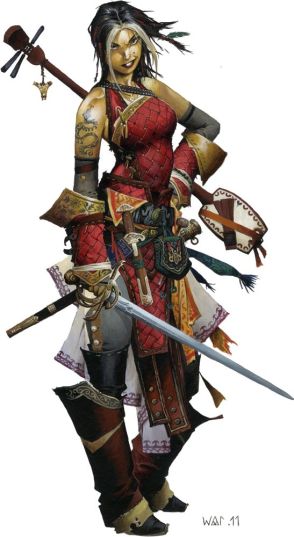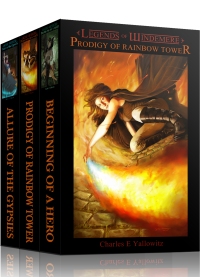This week, I’m going to talk about Ichabod Brooks’s favorite type of people: BARDS! I kind of started last week with the Ye Olde Shoppe post, but there’s that pesky weekend in the way. Now, a Bard is an interesting character type because it varies from platform to platform. Some are nothing more than minstrels by another name while others are artistic rogues or have some kind of magic. Much of the core of a Bard is established by the time of world they are in. One thing I have noticed is that 9 times out of 10, they have these two key points:
- They have a musical talent that is either instrumental or the voice.
- They act as storytellers of lore and history.
Being primarily a medieval character, the Bard is how information can travel. They spread the legends of heroes and listen for rumors that they can use for newer material. Some will even join adventuring groups to get the stories firsthand, which might be more of a Dungeons & Dragons thing. Keep in mind that most of my experience with Bards is through the game. They were originally a specialty class that you needed to work hard as a fighter and thief to get. Then they were put with the thieves as a theme or subclass type of thing. After that, they became their own character class, which came off as a Jack-of-All-Trades. Yet, something that always came up with them was their music and knowledge.
Outside of gaming systems, Bards tend to be side characters that appear to give the heroes some kind of information or be in the background. The musician playing for coins in a tavern is a standard piece of scenery, which gets a brief mention or turns into a comedic part of a bar fight. Yet, I have read a few fantasy stories where the Bard is more than a passing figure. They may help the heroes for a little bit of time to find something or escape pursuers. Others are spies and assassins that use their cover to get close to targets. After all, many people will stop paying attention to a musician in a tavern after a few songs or once they stop playing.
Another role for Bards is that they can tell the reader more about the world by singing or telling about events. Many people love to scream ‘SHOW DON’T TELL’, but these characters make a living off storytelling. So, you can get a little flexibility here since it’s within reason that a Bard would do this. Foreshadowing can be done here as well as getting the heroes to realize a clue that they have been missing. Maybe they were trying to find an old battlefield and they happen upon a local song that talks about it. Then they have to listen to the Bard or ask about it. The story progresses even if the Bard remains behind.
Now, I did mention Jack-Of-All-Trades because these characters tend to have a little bit of everything. They have magic, which can include healing (Priests/Clerics), combat/manipulation (Casters), and Nature (Druids). None of their spells are on par with those who specialize in magic, but it makes it hard to predict what they can do once they start casting. They also know how to fight (warriors) and can be very stealthy with a few thief skills. Again, they are decent in all of this, so a Bard would lose a fight going toe-to-toe in skills and abilities with a specialist. It’s their music and lore that they have over others because they wander and focus on knowledge collection in some fashion. Keep in mind that many fantasy worlds use song to tell history and legends, which is why Bards are seen as sage-like and smart.
In Legends of Windemere, Zephyr the blind boy with a gift for music would be the best example of a Bard. He is lacking the thief and fighter abilities since he’s a kid, but he has collected a lot of music and lore. Now, his songs are all instrumental, so his knowledge is stored and only shared when in conversation. As the series progresses, he returns and shows that he’s learned some magic, but he is still focused more on playing music than anything else. This still meets the role that Bards tend to play as entertainer and source of information. You might think Sari is one too since she performs, has magic, can fight, and has thief skills. The thing is that she’s actually one piece away from being a Bard, which is something gypsies don’t call themselves anyway. Sari doesn’t have much lore in her head since she never had an interest. This could change over time since she has that family diary, which I’ve yet to find a reason to bring back into the story. For now, she would be a very talented and versatile thief.
So, that’s my thoughts on what a Bard’s role is, which is probably different from what others think. Their variety of skills and uses means that it’s really the world that decides on how they operate. My experience is only D&D and Windemere, which are both limited since I haven’t used them a lot. There may be a few future stories that put a spotlight on Bards. Ichabod might even take one along on an adventure. Doubt it would be willingly, but you never know.






I had to laugh, knowing how much Ichabod hates bards. : D
Your concept of bards makes a lot of sense, considering the danger of the times. Who in their right mind would just travel around with a quill pen and parchment? Makes sense that person would have a bunch of weapons handy or magical skill. Their capacity to remember so many facts also is a great gift.
LikeLike
I don’t think the real bards and minstrels were like this though. Since stories traveled, the smarter plan would be to talk to newcomers and gather stories that way. D&D definitely changed it up since bards are more like thieves than other groups.
Great way to hint that Ichabod is about to go live.
LikeLike
Do you feel compelled to write songs into your stories, ala Tolkien? That would be frightening for me.
LikeLike
I considered it, but the best I can do is poetry. They wouldn’t fit to music though, so probably not.
LikeLiked by 1 person
I can’t even manage poetry, so it all scares me.
LikeLike
I’ve noticed a lot of people are scared of poetry. I blame high school doing a bad intro. Made people think it always has to rhyme and be deep.
LikeLiked by 1 person
Yeah, I can’t write it, and like very little. A few Robert Service and E. A. Poe pieces. Oh, and limericks, I like those.
LikeLike
Poe is always a good one. The ones snuck into bigger books is fun too. Never got the hang of limericks.
LikeLiked by 1 person
Very interesting thoughts, I had never given bards much thought before.
LikeLike
They’re used more for background from what I can tell. Just a way to add noise to a tavern. They get used a lot for disguises and assassins though.
LikeLiked by 1 person
The actual bards who these character classes are based on were, indeed, keepers of lore and history for their communities. In some cases, rulers called on them to advise in situations where the lore was involved. So bards can definitely be a resource for players who need to research a topic or gather information.
Many authors have used bards, harpers and minstrels as spies or covert operatives of some sort. For instance, McCaffrey’s Pern books featured Harpers whose job was to educate the young, carry news and messages, and be entertainers. They had certain songs they could sing when they felt people needed to be reminded of particular laws. Because they moved in a lot of social circles, they were always listening for interesting rumors.
LikeLike
Interesting. You don’t see they used as such in fiction these days. Not very often at least. I wonder if the bard concept has fallen by the wayside too. Can’t think of anything recent that had them as more than background.
LikeLiked by 1 person
It can be hard to express musicality in prose, perhaps.
LikeLike
True. I try to describe the music and people’s reactions. Though I haven’t used bards very often outside of Ichabod.
LikeLiked by 1 person
Sebastien de Castell uses bards quite a bit in his GREATCOATS series. They are all the things you mentioned plus a bit more mysterious, having hidden info that they only pass along to the heroes when they deem it necessary.
LikeLike
Bards would make for great spies. Sounds like that’s where this series went.
LikeLike